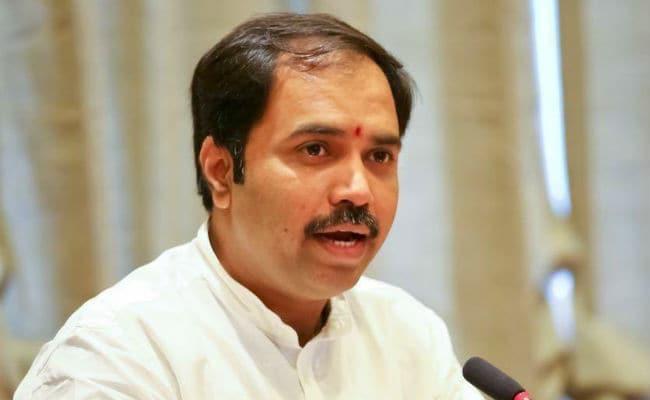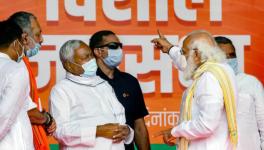Chowkidar Hi Chor Hai Part 3: How Maharashtra Labour Minister Got Away Without Paying Back Rs 50 Crore to 2 PSBs

Image Courtesy: NDTV
In Parts 1 and 2 of this series, we looked at loans granted by the Bank of Maharashtra to companies associated respectively with Nitin Gadkari and Narendra Modi. In this third part, we look at the case of a company linked to Sambhaji Patil Nilangekar, general secretary of the Bharatiya Janata Party in Maharashtra, and labour minister in the BJP-Shiv Sena government in the state.
Sambhaji Patil Nilangekar is the general secretary of the Maharashtra unit of the Bharatiya Janata Party, and is a minister in the BJP-Shiv Sena government that rules the state. He holds the portfolio of Labour, Skill Development and Entrepreneurship, and is seen as an up and coming leader of the party in the state.
Nilangekar is from a politically powerful family – his grandfather Shivajirao Patil Nilangekar was briefly a Congress chief minister of the state in the mid-1980s – in a politically significant region, Latur; the area has produced Vilasrao Deshmukh, a former Maharashtra CM, and former Union Home Minister Shivraj Patil, one of the Congress’ tallest leaders. Since Deshmukh’s death, the baton has been passed on to his son Amit Deshmukh in the Congress party in the region. The shift from the Congress to the BJP in the Nilangekar family took place a generation before Sambhaji, when his mother and Shivaijrao’s daughter-in-law Rupatai Patil Nilangekar joined the BJP and defeated Shivraj Patil in 2004. Despite neither family having contestants in the Lok Sabha polls—since the seat is reserved for Scheduled Caste candidates—the upcoming contest in Latur, polling for which will be held on April 18, is being seen as a clash between the Deshmukh and the Nilangekar clans, according to this report.
However, Nilangekar was the subject of a bank loan scandal that erupted in Maharashtra’s politics in 2016, which, in different circumstances, may have led to a downturn in his political fortunes. This article tells the story of that scandal.
Victoria Agro Food Processing
Victoria Agro Food Processing Private Limited is a company that is involved in the manufacture of alcohol. It operates a grain-based distillery in Latur district, which it set up in 2008 with financing of Rs 40 crore from the Union Bank of India (UBI) and the Bank of Maharashtra (BoM) in consortium. Both the banks financed around half of the total amount, the BoM’s share being Rs 20.99 crore.
According to an internal BoM document in NewsClick’s possession, the company was run by two individuals named Ashish Marwah and Mahendra Jajoo. Sambhaji Patil Nilangekar was listed as one of the guarantors for the loan received by the company, and the company’s registered office was shown as “Nilangekar Bungalow” in Latur. Marwah is married to Nilangekar’s sister Prajakta.
The company appears to be entirely in the control of three families, at least judging by the names of its directors and the guarantors for the loan. The five directors comprise the Marwah husband and wife, Jajoo, and two other individuals also with the surname Jajoo. The same five are also among the guarantors for the loan, along with Nilangekar (named as “Sambhajirao Diliprao Patil” in the document) and his brother Arvind.
According to the document, the factory failed to start production till 2011, due to “initial bottlenecks in fine tuning of machinery and getting desired outputs resulting in scarcity of resources due to mismatch in cash flow and commitment”. In plain language, the factory had spent too much, and was failing to produce the desired quality of the product, and as a result, the company was unable to service its debts.
As a result, the loan was declared an NPA in June 2011, and the company’s directors were listed as wilful defaulters. At that point, the BoM was owed Rs. 24.57 crore, while the UBI was owed Rs. 24.72 crore. After the declaration of the loan as an NPA, the banks first attempted to take action under the Securitisation and Reconstruction of Financial Assets and Enforcement of Securities Interest Act, 2002. This Act permitted the banks to take possession of the loan’s security, which, is this case, was the factory itself, and the plot where it was located. Notices under the Act were issued in September and December 2011. However, the banks did not take possession of the security till 2016.
In the meantime, the BoM also filed a complaint with the Central Bureau of Investigation’s (CBI’s) Banking Securities and Fraud Cell in February 2014. The CBI filed its chargesheet in July 2015, listing Nilangekar and several others among the company’s directors and the loan’s guarantors as parties to a “criminal conspiracy for cheating the Union Bank of India and the Bank of Maharashtra”. The CBI’s claim was that they had “tampered with a couple of pages of the 2009 mortgage deed”, and thereby illegally substituted the mortgaged property with another property of lesser value.
Also read: Corporate Bonanza: Trend of Writing off Bad Loans Continues
In 2015, the company attempted to reach a one-time settlement with the two banks, by trying to pay Rs. 41 crores according to the document in NewsClick’s possession. The banks rejected this offer, noting in the document that they “tried to convince the guarantor and key personal Mr. Nilangekar to improve the offer”, but he did not do so. The document listed a set of properties owned by Nilangekar in Delhi, Gurgaon and Jaipur, worth approximately Rs 100 crore, and thus it appeared to the banks that the company’s directors and the loan’s guarantors were capable of paying more than what they were offering.
Inexplicably, though, the same recovery departments and the two banks signed off on a much lower settlement three years later. According to a letter issued by the BoM on February 16, 2018, which is in NewsClick’s possession, it accepted Rs 12.75 crore as the final one-time settlement from the company. The UBI too settled for the same amount. With interest costs having accumulated, the total amount owed by the company in 2018 should have been around Rs. 62.85 crore, and thus, the banks wrote off over Rs 50 crore.
A Scandal That Wasn’t
Nilangekar was appointed Maharashtra’s labour minister in 2016. Soon after, in the same year, the fact that he was associated with this company was brought to light.
The opposition Congress tried to raise the issue for a while, and put the Chief Minister Devendra Fadnavis under pressure. A breach of privilege motion was moved against him in the Maharashtra Legislative Assembly in July 2016 for “shielding” Nilangekar.
The scandal went nowhere, however. After a few initial reports, the news cycle moved on, and Nilangekar continued as the minister. When the loan was settled in 2018, only a few news reports noted it. The CBI’s chargesheet, meanwhile, is yet to reach its conclusion. As of now, Nilangekar is thick in the cut and thrust of an election campaign in Latur, apparently entirely unaffected by this episode. Whether a farmer or an average middle-class citizen would go similarly untroubled if they failed to pay back crores of rupees that they owed is a question we shall not speculate on here.
The NPAs: A different standard for the rich and powerful
One cannot say now whether the CBI’s case against Nilangekar will succeed. In an interview conducted while reporting this series, a retired public sector bank official who spoke on condition of anonymity, speaking generally on criminal action in NPA cases, said, “Many of these cases are designed to fail.” Irrespective of whether this particular case fails or succeeds, the banker is referring to a larger pattern in the NPA cases.
Also read: What’s Going On, Mr. Watchman!
Recently, after a sequence of legal battles that were started by power sector companies – comprising some of India’s biggest corporate behemoths including the Adani, Tata and Essar groups – the Supreme Court struck down a circular issued by the Reserve Bank of India in February 2016, that had forced banks to crack down hard on NPA accounts. It has been argued by this author elsewhere that these power sector companies were on the verge of having massive loans turn into NPAs, and this legal process, as well as efforts by the government have prevented this from taking place.
As elucidated in these three articles, some bankers go out of their way to help companies connected to powerful individuals acquire massive loans. Then, the banking institutions write off large chunks of those loans once they turn into NPAs, despite fraud being discovered in many cases. However, when it comes to a common customer of a bank – whether a salaried professional, an informal sector worker, or a farmer or artisan – a stark contrast arises. While the former is rarely taken up by the political class and the civil society, loan waivers granted periodically by the government, particularly to the farmers, inevitably elicit howls of outrage.
As we pointed out in part 1 of this series, 82% of NPAs in the Indian banking system are held by corporates. Is it the case that this apparent lack of attention and frequent lack of credible action against large, well-connected and wilful defaulters is due to their connection to the political class? It would be hard to argue otherwise.
The NPAs crisis is a direct outcome of a nexus of politicians, industrialists, and bankers. It is not a result of a bad business environment or good faith business failures. It is not even a result of bad policy in India’s public sector banking industry. A frequent refrain from some has been that Indian banking needs privatisation and mergers of smaller banks to address “governance issues” that have created the NPAs pile-up. Those arguments have failed to explain how either privatisation or mergers will prevent the politician-industrialist-banker nexus. Whether there is a political will to address the root cause of the problem, only time will tell.
Also watch: 'Employee Directors Could Have Curtailed Bad Loans'
Get the latest reports & analysis with people's perspective on Protests, movements & deep analytical videos, discussions of the current affairs in your Telegram app. Subscribe to NewsClick's Telegram channel & get Real-Time updates on stories, as they get published on our website.
























